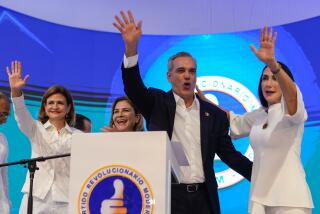Runoff Looms in Indonesian Election
- Share via
JAKARTA, Indonesia — President Megawati Sukarnoputri was fighting for political survival Monday as more than 110 million Indonesians went to the polls in their country’s first direct presidential election.
With more than 10% of the vote counted, former security minister Susilo Bambang Yudhoyono was in the lead but appeared to be falling well short of the majority vote he needed to win in the first round.
The final results may not be known for days. If no candidate wins more than half the vote, a runoff between the top two finishers is scheduled for Sept. 20.
The election was the first presidential vote since Indonesia threw out its electoral college-style system in 2002 and instituted direct elections to select its leader.
“This is the largest direct presidential election in the history of the world,” said Paul Rowland, Indonesia representative of the National Democratic Institute, a Washington-based organization that promotes democracy.
The peaceful conduct of the vote -- despite recent unrest in some areas -- prompted many Indonesians to express a sense of achievement in the growth of democracy six years after the collapse of former President Suharto’s military regime.
“I’m very happy and very proud,” said Mohammed Azis, a Jakarta street vendor, after casting his ballot. “We are in the learning process of democracy, but we are able to elect our president directly. I hope that Indonesia can be a good example for other Islamic countries.”
Former U.S. President Jimmy Carter, who visited a polling station in Jakarta, the capital, to observe the election, praised Indonesia’s progress in moving from authoritarian to democratic rule.
“We have been greatly impressed by the orderly and well-planned procedures taking place this morning,” said Carter, whose Atlanta-based Carter Center monitored polling places throughout the country.
Yudhoyono, a retired general who had served as security minister in the Cabinet of two presidents, was the clear favorite throughout the campaign. A recent poll suggested he would receive support from 43.5% of the voters, but early returns indicated that his support had slipped in the closing days of the campaign. With more than 15 million ballots counted, he was receiving 33% of the vote.
Megawati, who has been blamed by many for Indonesia’s slow economic recovery, was making a stronger finish than some had expected and might win a spot in a runoff.
Early returns showed her in second place with 26% of the vote, just ahead of another retired general, Wiranto, who had 23%. Wiranto, who uses only one name, was recently charged by a United Nations tribunal with crimes against humanity for his alleged role in the 1999 killing of more than 1,000 people in the former Indonesian province of East Timor.
An independent quick-count survey of 2,500 selected polling places, which may provide a more accurate forecast of the final result, showed Megawati and Wiranto running neck-and-neck for second place.
Conducted by the National Democratic Institute and an Indonesian pro-democracy group, the Institute for Social and Economic Research, Education and Information, the survey showed Yudhoyono in the lead with 33.9% of the vote, Megawati with 24.9% and Wiranto 23.8%.
About 154 million people were eligible to vote, and officials anticipated a turnout of more than 75%. Election officials ordered many ballots recounted after voters who did not unfold them completely punched multiple holes in the paper.
But overall, the smooth handling of the election was a triumph in a country where lawlessness often prevails.
“Autocratic leaders we had before thought the Indonesian people were not mature enough to choose their own leader,” said Rizal Mallarangeng, executive director of the Freedom Institute, a Jakarta think tank. “It’s proven today that we can do it.”
Indonesia has the world’s largest Muslim population, and for some, the election was evidence that Islam and democracy can coexist.
In the poor Tanah Abang neighborhood of Jakarta, one polling station was set up at a mosque, and election officials borrowed the mosque’s loudspeaker -- used for the call to prayer -- to urge voters to cast their ballots.
“This is a historic moment for Indonesia,” said Hani Sutardi, 76, who has been voting in elections all her life but cast her first ballot for a presidential candidate Monday. “This time we are free to vote for whom we want.”
Mallarangeng, who was educated in the United States, says that no matter who wins the election, the real victory is in allowing the voters to choose their own leader.
“We are proud of whoever is elected president because we elected them ourselves,” he said. “For the people, by the people, of the people. This is what you are watching today. The essence of democracy, the essence of liberty.”
More to Read
Sign up for Essential California
The most important California stories and recommendations in your inbox every morning.
You may occasionally receive promotional content from the Los Angeles Times.













